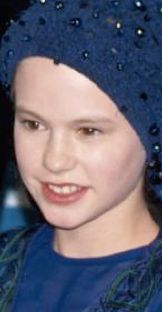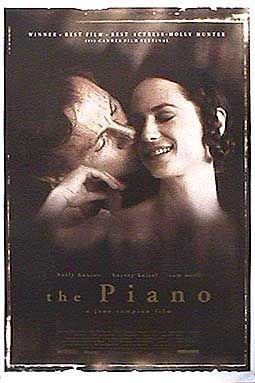 It's suffered some delay (and will likely see something like a marathon in the next ten days or so) but, with this post, Supporting Actress Sundays for 1993 have officially begun. And we begin, as we always do, with the winner -- who just happens to be among Oscar's most precocious. As I noted in a post a while back about "Precocious Supporting Actressness," assessing performances by kid actors can present special challenge. But with this week we happen to have a (still) young actress who has defied all the cliches to develop a career that might just be one of the most distinguished among her fellow nominees, an all the more remarkable accomplishment when we recall that she took home the trophy at age 11 for her film debut. So without further ado: let's consider the abundantly precocious, trophy-snagging work of...
It's suffered some delay (and will likely see something like a marathon in the next ten days or so) but, with this post, Supporting Actress Sundays for 1993 have officially begun. And we begin, as we always do, with the winner -- who just happens to be among Oscar's most precocious. As I noted in a post a while back about "Precocious Supporting Actressness," assessing performances by kid actors can present special challenge. But with this week we happen to have a (still) young actress who has defied all the cliches to develop a career that might just be one of the most distinguished among her fellow nominees, an all the more remarkable accomplishment when we recall that she took home the trophy at age 11 for her film debut. So without further ado: let's consider the abundantly precocious, trophy-snagging work of...

...Anna Paquin in The Piano (1993)
approximately 37 minutes and 35 seconds
61 scenes
roughly 31% of film's total running time
 Ada's just been married off to a New Zealand settler and Paquin's Flora is along for the ride, serving as her mother's translator as the two journey from Scotland and arrive in this astonishing "new" land.
Ada's just been married off to a New Zealand settler and Paquin's Flora is along for the ride, serving as her mother's translator as the two journey from Scotland and arrive in this astonishing "new" land. Paquin's Flora is a precocious child, to say the least. Her mother's love buoys Flora, even as her mother's dependence fortifies the child's unusual confidence and certitude. Moreover, Flora's a girl as yet unfettered by the stymying self-consciousness of adolescence.
Paquin's Flora is a precocious child, to say the least. Her mother's love buoys Flora, even as her mother's dependence fortifies the child's unusual confidence and certitude. Moreover, Flora's a girl as yet unfettered by the stymying self-consciousness of adolescence. The combination establishes Flora as a significant force to be reckoned with amidst a narrative fraught with charged intimacies.
The combination establishes Flora as a significant force to be reckoned with amidst a narrative fraught with charged intimacies. The construction of the character of Flora is among director Jane Campion's deftest strokes in a film lush with cinematic mastery.
The construction of the character of Flora is among director Jane Campion's deftest strokes in a film lush with cinematic mastery. See, the character of Flora, when it comes right down to it, functions as a plot device (a mechanism through which crucial information is conveyed and essential action is impelled).
See, the character of Flora, when it comes right down to it, functions as a plot device (a mechanism through which crucial information is conveyed and essential action is impelled). Yet, Campion -- in Flora -- has crafted an utterly plausible character: a smart, creative and witty person entirely capable of doing everything the narrative requires of her while still behaving as a smallish child.
Yet, Campion -- in Flora -- has crafted an utterly plausible character: a smart, creative and witty person entirely capable of doing everything the narrative requires of her while still behaving as a smallish child. Moreover, Campion and Paquin permit Flora's conflict to be a simple one: she's used to having her mother all to herself and she's not especially happy when she must share her with not just one but two other people.
Moreover, Campion and Paquin permit Flora's conflict to be a simple one: she's used to having her mother all to herself and she's not especially happy when she must share her with not just one but two other people. This choice on Campion's part -- creating a bold, complicated kid character but anchoring it within a sublimely simple character arc -- permits the kid actor Paquin to do "behave" as Flora rather than "act" each scene.
This choice on Campion's part -- creating a bold, complicated kid character but anchoring it within a sublimely simple character arc -- permits the kid actor Paquin to do "behave" as Flora rather than "act" each scene. It's a risky "turn 'em loose" strategy for directing a kid actor but one which, at least here, elicits a captivating -- by turns sweet, silly, and serious -- performance from Paquin. Campion does not ask Paquin's Flora to provide the cutesy commentary for the film, nor does she depend on the char/actor to stir easy sentiment. Rather, as perhaps the most decisive character in the narrative (and the only character implicitly trusted by everyone else, for better or worse), Paquin's Flora becomes an active ingredient in the curious chemistry experiment Campion stages in The Piano, a supporting kid character that both serves the narrative requirements of the film while somehow feeling uncontrived.
It's a risky "turn 'em loose" strategy for directing a kid actor but one which, at least here, elicits a captivating -- by turns sweet, silly, and serious -- performance from Paquin. Campion does not ask Paquin's Flora to provide the cutesy commentary for the film, nor does she depend on the char/actor to stir easy sentiment. Rather, as perhaps the most decisive character in the narrative (and the only character implicitly trusted by everyone else, for better or worse), Paquin's Flora becomes an active ingredient in the curious chemistry experiment Campion stages in The Piano, a supporting kid character that both serves the narrative requirements of the film while somehow feeling uncontrived. Campion's clarity is all the more admirable for the ways she refuses the easy out of letting blame hover over the "blameless child". Campion neither absolves Flora for her actions, nor does she punish Flora for her part in the intimate tragedy.
Campion's clarity is all the more admirable for the ways she refuses the easy out of letting blame hover over the "blameless child". Campion neither absolves Flora for her actions, nor does she punish Flora for her part in the intimate tragedy. Paquin's Flora is simply (like all the major characters in this film) complicated and flawed, capable of great kindness and great cruelty -- she's never "just" a kid.
Paquin's Flora is simply (like all the major characters in this film) complicated and flawed, capable of great kindness and great cruelty -- she's never "just" a kid. As an actor, Paquin's clearly following a script (and Campion's meticulous direction) at the same that she is improvising Flora's reality in each moment.
As an actor, Paquin's clearly following a script (and Campion's meticulous direction) at the same that she is improvising Flora's reality in each moment. Paquin inhabits the character with alacrity and verve, her chattery vocality creating the film's most memorable non-musical soundings. And while I think it would be a mistake to call Paquin's performance "natural" (as this is clearly a sculpted and shaped performance), Paquin's work in the role maintains an ease and spontaneity that remains impressive.
Paquin inhabits the character with alacrity and verve, her chattery vocality creating the film's most memorable non-musical soundings. And while I think it would be a mistake to call Paquin's performance "natural" (as this is clearly a sculpted and shaped performance), Paquin's work in the role maintains an ease and spontaneity that remains impressive. Anna Paquin's performance as Flora is an essential component of Jane Campion's extraordinary, enigmatic and haunting film and it might just be some of -- if not the -- best work by a kid actress "actressing at the edges" of the category in the 70+ years since its inception.
Anna Paquin's performance as Flora is an essential component of Jane Campion's extraordinary, enigmatic and haunting film and it might just be some of -- if not the -- best work by a kid actress "actressing at the edges" of the category in the 70+ years since its inception.

9 comments:
This is a very nice writeup. I really think it IS hard critiquing child actors...especially in first performances. Is this their innate charm, is it their prodigious skill. I like Anna though.
Couldn't agree more with the last paragraph.
I think I'm gonna save this performance for the last viewing. :) it's such a special movie that I haven't seen in a very long time.
but all this child actors stuff makes me wanna have 1973 for October's Horror Month!
It is easily my choice for the greatest child performance. So haunting, believable, and unforgettable. Paquin lends a hand in making Campion's film the masterpiece it is.
You said: "Paquin's Flora is simply (like all the major characters in this film) complicated and flawed, capable of great kindness and great cruelty -- she's never "just" a kid."
And oh, how I so agree. It's astonishing how Paquin tunes her performance to fit the mold of "The Piano"'s many themes of morality. Can I child feel or notice such moral decisions? It's a difficult question, but at the same time, Flora is one who seems to prove that possibility. The regret, heartache, and innocence of her desicion ultimately effects her and her mother in ways she never would have imagined. She believed she was doing the right thing, but ultimately became punished of it through the mother she holds so dear to her.
Powerful stuff. :-(
Easily one of my very favorite winners of the supporting actress category.
Regarding more kid actors:
Even though 1973 has both Linda Blair and Tatum O'Neal, don't forget that 1956 has what is -- to my mind at least -- the most weird/fascinating kid performance ever nominated: Patty McCormack in THE BAD SEED.
I had recently seen The Bad Seed for the first time. I was very captivated by the film and especially by Nancy Kelly's stunning performance!!!
yes, Patty's performance is so strange... and what fascinated me the most was her capacity to carry out long scenes (with one shot) that required lots of change of moods and a lot of acting instinct! fascinating!
This film and performance failed to draw me in, really... Paquin was just fine as a kid playing a kid, but so much of the performance was still just "school-play acting". I don't think it comes anywhere near the "best child performance of all time". Still really surprised that this particular perf won, when the other contenders in the category all fit the 'winner's mold' far more easily... perhaps there was some anti-Hispanic bias that prevented Perez from winning for a showy, baity role.
IMO, the best 'kid performance' I've ever seen - although it is a lead role and it is by a boy - is Ivan Dobronravov's perf in Andrei Zvyagintsev's "The Return"
The second best supporting actress (and child performance) of the year after Christina Ricci in Addams Family Values.
Glad she won, and glad to see her career has gotten back into its groove.
To clarify: I don't think Paquin's the best kid performance of all time. Just possibly one of the best (if not the best) of the eleven kid actors to have received a nomination as Best Supporting Actress.
Post a Comment